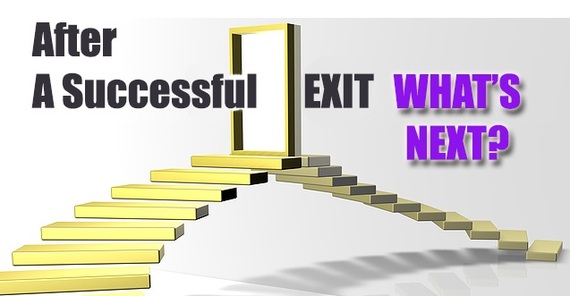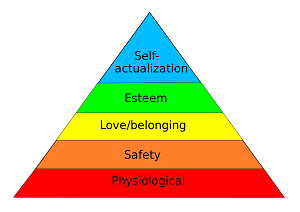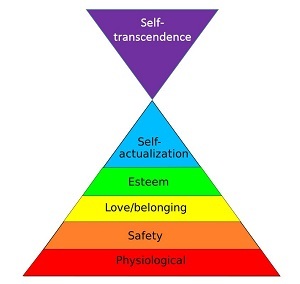Without a doubt there's an abundance of entrepreneurial advice published about how to start a business, how to rapidly scale it and of course, how to exit it successfully . . . but there's almost no advice for those who've been there, done it and exited. It seems everyone is preoccupied with the challenges of succeeding, and no one is paying attention to the needs and challenges of those who've successfully sold their business.
Of the 500,000 startups launched annually, less than half make it past their first year, and only about 5% or 25,000 exit successfully. These are challenging odds and you might assume that anyone who has beat them would be elated; but the assumption is only partially correct, at least according to the network of founders I know and work with. In addition to the up-side, there's a down-side in which these extraordinary individuals also report feelings of loss, bewilderment and even confusion when it comes to what's next in their lives.
One might think, "Have they lost their minds?" There's no doubt they've lost something, but it's not their mind. What many founders face after selling their business is a loss of identity, meaning and purpose, three very important factors associated with owning and operating a successful enterprise. When a founder exits their business they also exit all the relationships, experiences, engagements and challenges connected with it. All these things are essential contributors to one's identity and sense of personal value. I call this condition the "Founder's Dilemma" and it was Abraham Maslow who first addressed it in his 1943 paper, "The Theory of Human Motivation," or what is better known as "Maslow's Hierarchy of Needs."
Organized like a pyramid, Maslow depicted our human needs in five hierarchical states. Each of the five plays an important role in our happiness and sense of well-being, and without all five being fulfilled, Maslow asserted that we simply will not be happy, regardless of what we achieve or how much we accomplish in our lives.
At the base of Maslow's pyramid are our Physiological needs, our basic survival instincts and vital necessities such as air, water, food and shelter. The next state is our Safety needs which include personal and financial security, physical health and well-being and protection against adverse impacts. Third is Belonging, our experience of love, inclusion, friendship, intimacy and family. The fourth state is our Esteem needs of being accepted by others, feeling respected and respecting ourselves. And fifth, at the top of the pyramid is the state of Self-Actualization, our need to attain our full potential and be the very best and most we can be in our lives.
Maslow believed that in order to graduate up through the five states to Self-Actualization, we must not only achieve all the previous states in the pyramid, we must actually master them. This distinction between achievement and mastery must not be overlooked as it may well be the source of why successfully exited founders tend to experience loss and bewilderment along with elation and accomplishment.
This mastery, or "self-mastery" as I call it has to do with two things. First, it includes the realization that what we achieve or acquire in our lives is not the sole source of our fulfillment, but that there is another crucial factor having to do with challenging ourselves to grow, making a contribution to others and positively influencing the world. Another way of understanding this point is that it is only when we've gotten enough of what we don't really want that we realize our happiness does not depend on what we have, but on the degree of authentic conviction we invest in the process.
The second aspect of self-mastery has to do with a Sixth need which Maslow, in his later years acknowledged was missing from his model. He called it Self-Transcendence and it pertains to surrendering over the significance of our personal identity to a greater self or higher power; a spiritual presence that isn't dependent upon our ego self, but rather is based on a greatness of character dwelling within us. This greatness of character is about recognizing that who we are exists beyond the confines of our personal identity and that the "I" we know actually exists as an interconnected sharing with others, with the whole of humanity, and with the majesty of Nature and Life itself.
So what's the bottom-line of this top-heavy conversation? I believe the Founder's Dilemma has to do with graduating to a high state of material accomplishment without attaining a comparable high state of self-mastery accomplishment. So why is this practice of self-mastery so important?
Because if a founder misidentifies who they are with what they have, when they sell what they have, they also sell who they are. The upshot of this unfortunate symbiotic transaction is that we end up with a surplus of cash and a deficit of self.
Those who find validity in the Founder's Dilemma as well as see the relevance of Maslow's Hierarchy of Needs are optimally positioned to engage in the work of self-mastery. But where does one begin? Right at the apex of the pyramid with Self-Transcendence. By being willing to redefine ourselves, seek out our deeper greatness of character and share the journey of what's next in our lives with other like-minded professionals, we actually move from Exiting to Entering, and along with this entrance comes all the relationships, experiences, meaning and purpose one aspires to most, but with one important difference. Rather than our identity hinging upon what we have, it is solidly based on the greatness of who we are. And that difference my founding friends is something to be genuinely elated about. ~
Val Jon Farris is a senior mentor for Richard Branson's XTC competitors and CEO of Diamius Multinational, a Fortune 100 consulting firm specializing in working with successful business leaders and founders.


